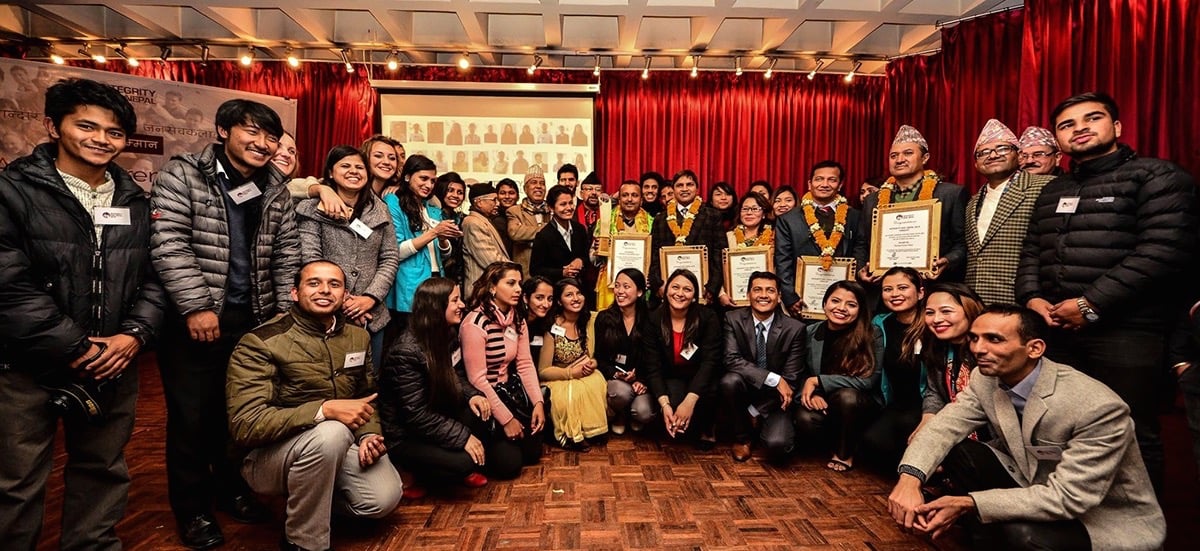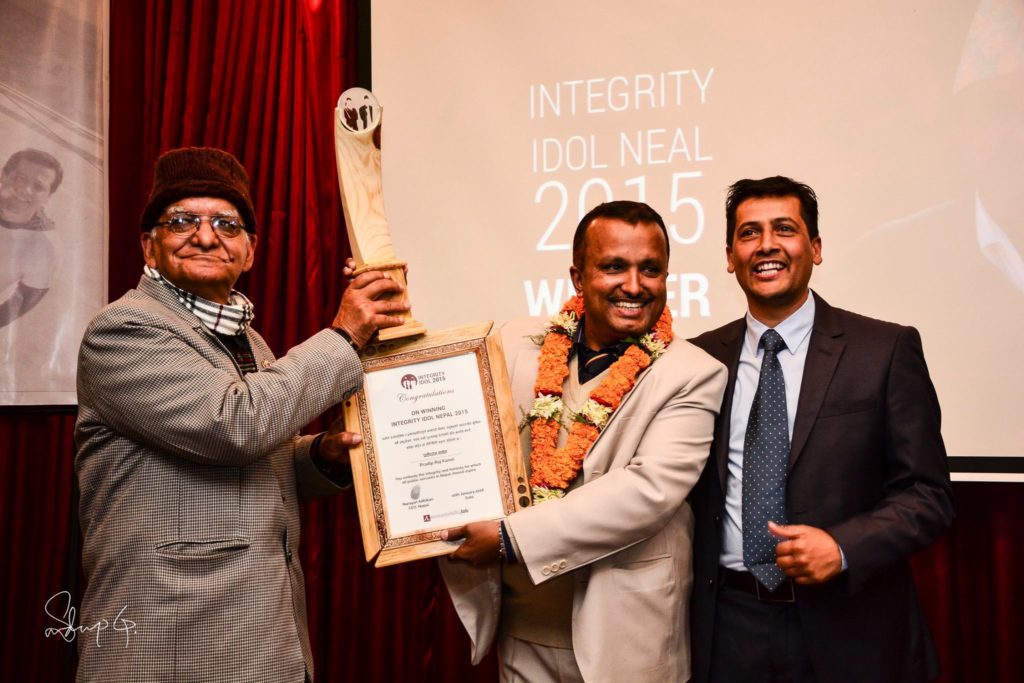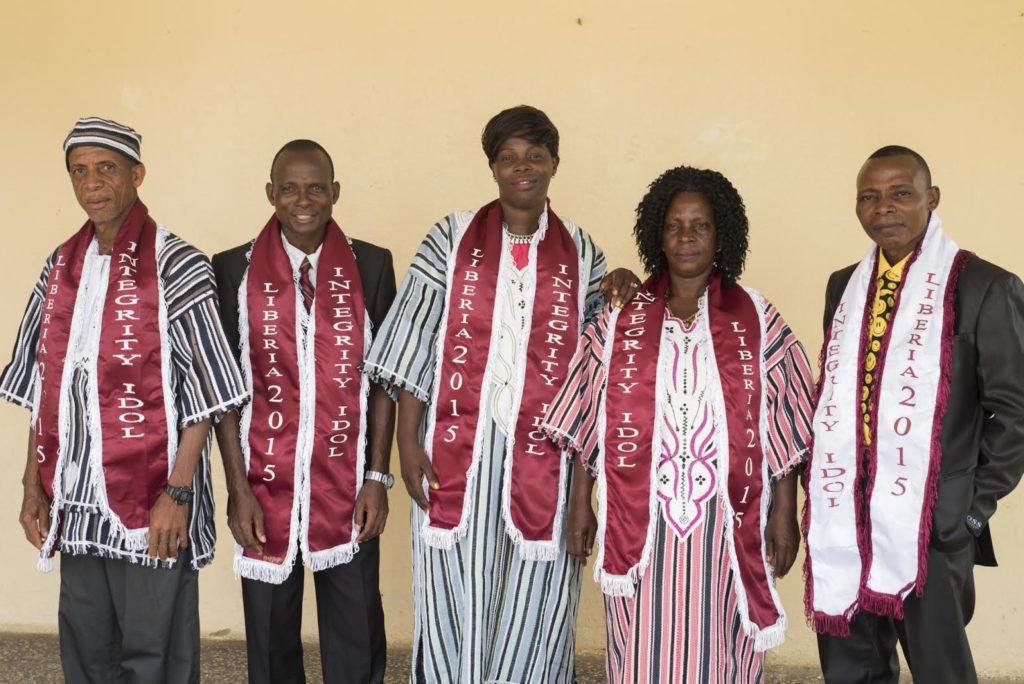NEWS
March 1, 2016

IN BRIEF
By: Andrew Bezek, Ivy. This article was originally published by Ivy Magazine. On the Nepali version of American Idol, there’s a Nepali version of Simon Cowell—hilariously rebuffing poor performances and glowering at the contestants. After working against corruption in developing countries for nearly a decade, IVY member Blair Glencorse had corruption on the mind as he was sitting and watching that Cowell scowl. He wanted a new way to frame corruption and thought to himself—what about reality TV? “We wondered,” says Glencorse, “What if instead of putting corrupt officials behind bars, we put honest officials in from of cameras?” So [...]
SHARE
By: Andrew Bezek, Ivy. This article was originally published by Ivy Magazine.
On the Nepali version of American Idol, there’s a Nepali version of Simon Cowell—hilariously rebuffing poor performances and glowering at the contestants. After working against corruption in developing countries for nearly a decade, IVY member Blair Glencorse had corruption on the mind as he was sitting and watching that Cowell scowl. He wanted a new way to frame corruption and thought to himself—what about reality TV?
“We wondered,” says Glencorse, “What if instead of putting corrupt officials behind bars, we put honest officials in from of cameras?” So with his organization, the Accountability Lab, he launched “Integrity Idol” to find the most honest man or woman working in Nepal. Five government officials were chosen and profiled on television, and people for voted for their favorite contestant.
The first Integrity Idol collected over 300 nominations, and over 4 million people, or 10% of the population of Nepal, watched the show. But what was most amazing for Glencorse and his team was the conversation it sparked. The Chief Civil Servant in the country presented the award to the winner in a televised ceremony, and the winner has since been consulted by the government for national strategies. He’s even been invited to speak in front of the U.S. Congress.
But despite real success in Nepal with Integrity Idol, there’s so much more work to do to combat corruption. Glencorse sat down with IVY Magazine to talk about his work in Nepal, across the globe, and how he’s changing the future of corruption.
Blair is an IVY Member (DC). Connect and collaborate with him here.
“I would argue that every organization these days has to have a social impact value proposition. Take businesses for example: it is not good enough now to simply make a profit.”
What does “social impact” mean for 21st century businesses?
I would argue that every organization these days has to have a social impact value proposition. Take businesses for example: it is not good enough now to simply make a profit. Consumers are more aware than ever and will vote with their money. For example, all businesses need to indicate that they treat workers fairly, that they have transparent supply chains, that they use fair procurement processes, and so on. It’s essential.
Do you think integrity has changed throughout history? Do we have more integrity now than we have in the past, or has our integrity remained fairly constant?
Good question! There have always been people of incredible integrity, no doubt about that. These days, there are more tools that we can use to make information open and processes more transparent, which helps too. The issue here is that at its heart, the idea of integrity relates to incentives, which are often political. How can we change incentives so that we all act with integrity?
One way is with “sticks,” or punishments for wrongdoers. These are important, but as with Integrity Idol, what we are finding is that “carrots,” or rewards for do-gooders, are often more useful. They build credibility and allow for buy-in for integrity by giving people examples to live up to and an incentive to follow.

“How can we change incentives so that we all act with integrity?”
How is technology and instant communication changing how we think about integrity?
Data can be made transparent online now, and citizens can use tools to obtain, measure, and monitor behaviors and actions in ways that were unthinkable 20 years ago.
So technology helps a huge amount, although I think we often fall into the trap of seeing the tech tools as the goal, rather than one aspect of a larger effort to improve transparency and integrity. In the end, the incentives and relationships around issues of integrity and accountability are all human, and the approach necessitates a human approach. Tech tools can facilitate and leverage that but in themselves are not enough.
How would you define integrity?
Integrity is being honest and acting according to moral principles. For us, it is also about following through on decisions and commitments. Too often promises are made, but the subsequent actions do not happen. Integrity is about bringing the two together. In our work, we relate this in particular to people in power (in government for example) who have a commitment to citizens, but are often not held accountable for their decisions.
“Integrity is being honest and acting according to moral principles. For us, it is also about following through on decisions and commitments.”
Do you think Accountability Lab has the power to become an important Foreign Policy tool for the United States?
Ha! Well, we’re an independent civil society organization, and our objectivity and neutrality is really important to us. We work in countries (like Pakistan), where there can be suspicion of foreign governments, so we make it very clear that we are non-governmental and are working with citizens to support accountability.
That said, we work with governments where we can to support collective efforts around these issues. In Liberia, for example, we work closely with the government of Liberia on the Open Government Partnership, a series of commitments as part of an international process (led by the U.S. among other countries) for greater transparency.
In all the countries we work in, we talk to the U.S. Embassies and with the aid machinery in D.C. to share ideas and lessons and feed learning from the ground back up into policy.
In the past, the U.S. has relied heavily on nation-building to solve conflicts. Do you see Accountability Lab as an alternative?
There is of course a significant debate around the U.S. role in the world and in nation/state-building in the Middle East and beyond. I think change happens internally and needs to be locally-owned and led. Foreign governments can help, but it has to be a very carefully designed process, of course.
At the Accountability Lab, we can’t possibly replace the important role that the U.S. government might play in these processes, but what are doing, I think, is supporting really great, creative, and grass-roots young people to solve problems within their communities. And we’re learning a lot from that process that can inform thinking and practice around accountability and governance more broadly. This is important because I would argue that most conflicts and state-failure globally are one way or another caused by a lack of accountability and integrity.

“I think change happens internally and needs to be locally-owned and led.”
What advice do you have for other IVY members who might also be interested in social impact and eager to get involved?
I would encourage them to get involved absolutely! Setting up your own organization may or may not be the right path; it depends on the issue and the situation, but working for a social impact organization is a fantastic experience. If anyone would like to get involved with the Accountability Lab, either in the U.S. or in West Africa/South Asia, they can reach out to me at[email protected]. We’d love to hear from them!
IVY is a social university dedicated to inspiring connection, collaboration, and growth. To learn more, visit IVY.com.
